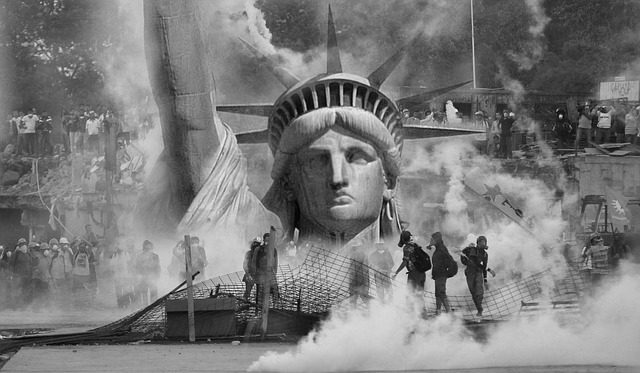
What’s happening to American freedom and democracy? Is it in danger? Is it thriving? Or is it going to extremes?
National Review‘s Jonah Goldberg, a prominent conservative Never-Trumper, has written a book entitled Suicide of the West: How the Rebirth of Tribalism, Populism, Nationalism, and Identity Politics is Destroying American Democracy.
He argues that America’s freedom and prosperity were the result of a “miracle,” a conjunction of certain religion and cultural influences that led to the liberation of the individual and to other unparalleled social benefits. But that we are currently throwing that heritage away in favor of new collectivist ideologies on both the left and the right.
In a review of the book, Michael Brendan Dougherty agrees that liberal democracy (that is, liberal in the etymological sense of “freedom”) is in trouble. But he takes issue with part of Goldberg’s thesis. From Off the Shelf: Suicide of the West:
Instead of a diminution of liberalism in the West, I think I see the logic of liberalism intruding where it has no place. Separated from any reciprocal sense of duty, the language and habits built around “human rights” can make our natural selfishness more destructive. This sovereign individual is becoming incapable of making covenants with his nation, and even his loved ones. In the hyper-liberal order, commerce is now more important than the bonds of religion and family. We have a society in which credit-card debt is legally much more difficult to escape than a marriage. A religious group that tried to deploy social stigma to effect discipline and respect for its doctrines would be the subject of immense scandal. But the government garnishing your wages to pay for a student loan it gave you for a useless degree is just ho-hum.
The complex mix of social, political, and cultural attitudes produced by hyper-liberalism seems to be overcoming our human nature. I’m less worried about foaming tribalists drunk on natural passion than I am of a generation of grass-eating males, who mute the natural passions and ambitions through drugs, pornography, and the flickering of the backlit screens. And so, in the immediate future, I don’t fear a return to the natural, I fear our continued flight from it. Conservatives used to look at the falling rates of teen pregnancy in the 1990s as a sign of healthy recovery after the antinomian cultural revolution. Now I look at them with utter dread. This isn’t a return to chastity. It’s young people barely venturing out to do “what comes natural” and bonding with each other at all. Americans have fewer friends than they did a generation ago. They socialize less. They marry less. They have fewer children. And the ones we do have are more often than not half-abandoned by their fathers. But they certainly still participate in commercial society, and a small segment of them dream of creating the next major technological breakthrough. . . .
The diminution of religion and the refusal of so many to create a posterity is fatally weakening Western man’s capacity to lay aside his immediate desires for any greater good. There is simply no reward in his sacrifice if its value is not recognized in the hereafter, among his descendants, or by his society. This total disenchantment of our social life, in turn, gives even greater incentives for those with power to further de-rationalize any sense of national or “tribal” obligations, as they seek to liberate themselves from any residual duties to their own countrymen.
I am intrigued by Dougherty’s point that commerce has taken the place of religion.
Perhaps liberal democracy has developed to the point that its love of freedom has turned into moral and spiritual license, and its individualism has turned against community and culture itself. That is to say, liberalism has been taken so far that it undermines the very religious, moral, and cultural factors that make it possible. Thus committing suicide.
Is there a solution?
Illustration by engin akyurt via Pixabay, CC0, Creative Commons













